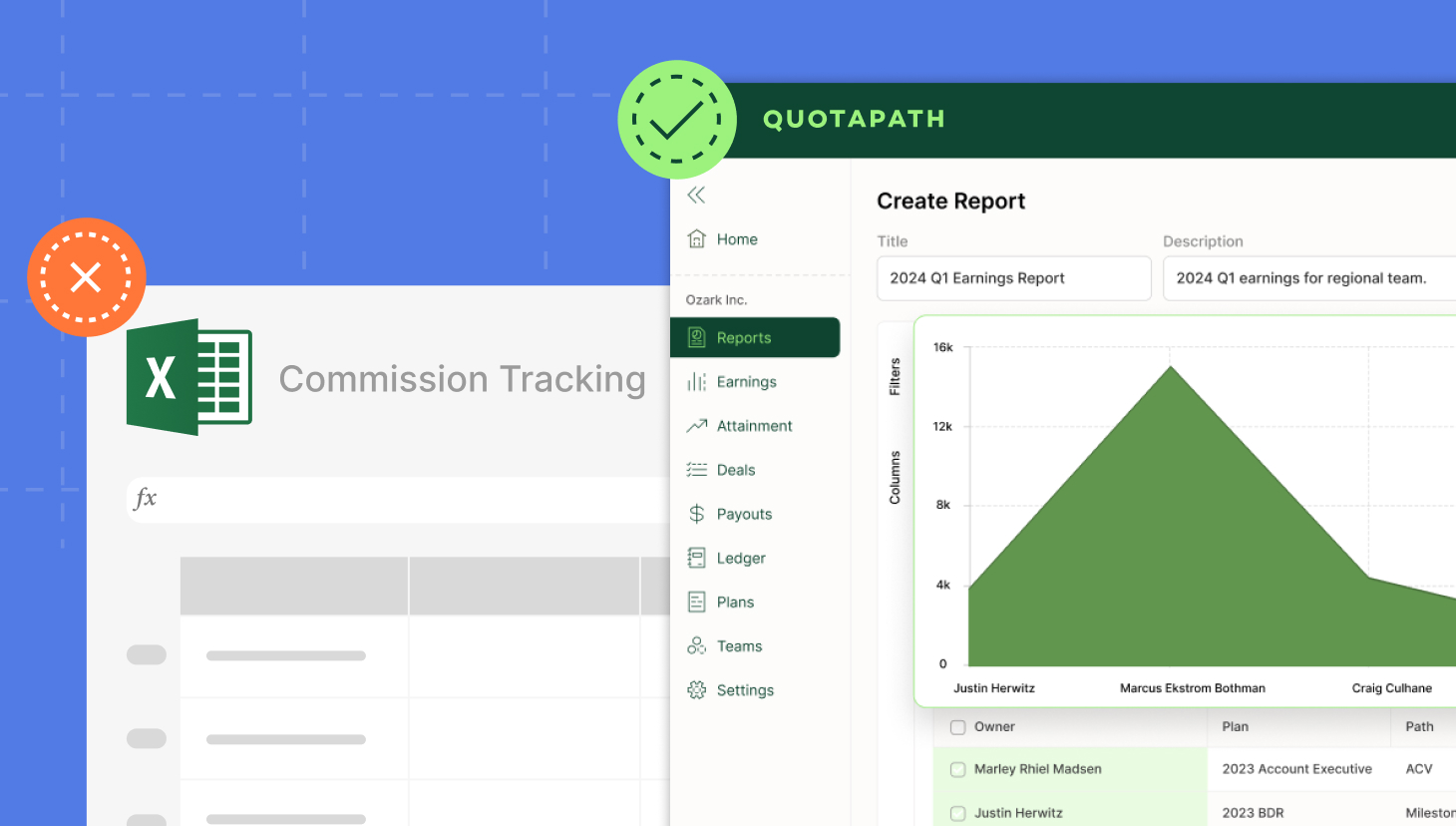Are you just beginning your career in sales and struggling to understand your sales compensation plan? Or, maybe you manage a team and are looking for sales compensation plan examples. Between salary, commissions, bonuses, spiffs, and incentives—there are a lot of variables—and understanding your sales compensation plan may feel overwhelming now, but we’re here to break it down for you.
RevOps, sales leaders, and finance teams use our free tool to ensure reps’ on-target earnings and quotas line up with industry standards. Customize plans with accelerators, bonuses, and more, by adjusting 9 variables.
Build a Comp PlanWhat is a sales compensation plan?
For individual sales reps, a sales compensation plan (or commonly ‘comp plan’) summarizes how much money you can and will make and might consist of base salary, commission, incentives, and benefits.
A sales compensation plan drives the sales team’s performance and motivates them to achieve organizational goals and increase revenue. Companies will structure their sales compensation plans based on budget, business and team structure, competitive landscape, and employee needs. The right kind of sales compensation plan will reward desired behaviors and foster more consistent performance on a monthly, quarterly, and yearly basis.
What components make up a sales compensation plan?
Salary
A base salary is a set amount of money that sales reps earn no matter how well (or poorly) they perform at their job. Base salaries are designed to help sales reps to manage their cash flow and cover basic living expenses. Companies in very competitive markets will typically have a lower base salary or no base salary at all in their sales compensation plans. For example, most auto salespeople, realtors, and door-to-door sellers don’t have a base salary, whereas a company with fewer competitors may balance a base salary and commissions more equally. Typically software sales, medical sales, and hardware sales will receive a base salary.
Commission and Incentives
It’s no secret that sales reps often thrive off of competition, and there are a number of incentives that can be used to motivate them to achieve company goals, and benefit them individually by rewarding their hard work.
A sales compensation plan with commission or bonus components allows flexibility in how much they earn and can enable some reps to earn very high incomes.
Commissions
Commissions are earnings received based on performance and are most commonly a percentage of the deal sold.
- Flat Rate Commissions: Rates remain the same for all items that meet the criteria, i.e. 10% of any deal sold
- Rate Commissions: Rates change based on achievements and filter criteria, i..e. you earn 10% of new business deals and 15% of retention deals
- Fixed Amount per Deal Commissions Plan: Pays a specific rate for every deal sold, i.e. $50 for every deal sold
Bonuses
Bonuses are used as an incentive for when sales reps meet or exceed a pre-defined goal. They might be expressed as a percentage of cumulative revenue, or as a dollar amount. Bonuses can be structured and awarded in different ways, here are a few examples:
- Year-to-Date Bonus Plan: Bonus awarded for achieving quotas set for each quarter, month, or milestone during the year, i.e. if you hit your monthly quota, you earn a $500 bonus
- Ranking Bonus: Bonus awarded for final ranking within a group of users, i.e. if you’re the top seller for a month, you earn a $500 bonus
- Bonus on Multiple Quotas: Bonus awarded for achieving a combination of quotas, ie. if you hit your new business quota and your retention quota, you earn a $500 bonus
Accelerators
Accelerators are used to reward reps for exceeding the set targets and goals.
- Accelerated Rate Tiers by Attainment: Rates change based on quota attainment or amount sold, i.e. 10% of any deal sold until the quota is achieved, at which point you earn 20% of any deal sold
- Accelerators with Multipliers: Rates change based on achievements and are multiplied by additional criteria i.e. you earn 10% on 1-year deals, 15% on 2-year deals, and 20% on 3-year deals
Try the most collaborative solution to manage, track and payout variable compensation. Calculate commissions and pay your team accurately, and on time.
Start TrialExamples of sales compensation plans
So how might all of these variables work? Here are some examples of sales compensation plans comprised of some, or all of these elements:
Commission-only sales compensation plan
A commission-only plan means reps earn entirely based on their performance. With a plan like this, the risk for the company is relatively low, but it’s challenging for both the company and the reps to forecast any expenses and budget. These plans are common in real estate, auto sales, and door-to-door sales. Sales reps take caution with these plans as it may be an indicator that the company isn’t truly investing in developing talent.
Reps typically get paid anywhere between 5% to 45% commission. The percentage is influenced by how much effort goes into a sale, and how complex the sales cycle is.
Base salary plus commission sales compensation plan
This is the most common sales compensation plan. It provides the rep with a fixed base salary as well as earned commissions, giving them reliable income and an incentive to sell. Companies with this plan structure have greater clarity into expenses, plus the benefit of being able to tap into the competitive nature of salespeople.
Base salary plus bonus sales compensation plan
A base salary plus bonus sales compensation plan is effective when reps tend to consistently surpass pre-set targets. It might be structured with a traditional bonus based on hitting multiple quotas, or with an accelerator. A plan like this allows a company to maintain predictability while still motivating reps to close deals.
There are some really terrible compensation plans out there. A successful sales compensation plan will be specific to the role, aligned to company culture and goals, and designed to drive the right behaviors.
The potential combinations of salary, commissions, bonuses, and incentives are endless, leading to complex spreadsheets and formulas to calculate your earnings. But, it takes less than 5 minutes to add your plan to QuotaPath. Start automating your earnings calculations and spend that time-saved closing deals.



